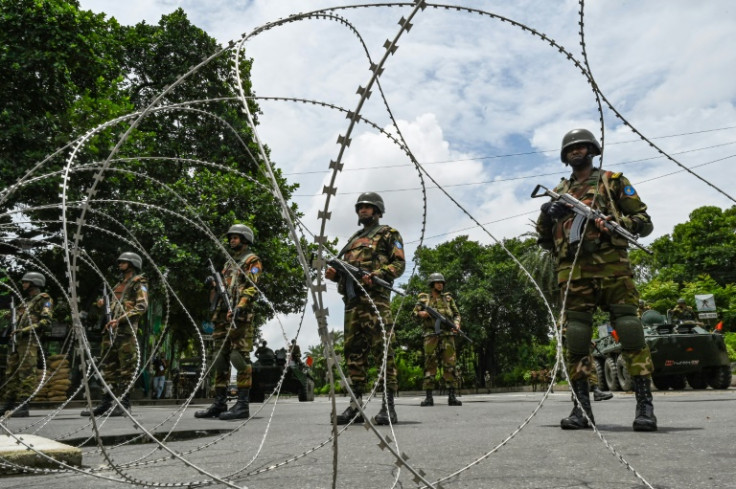Bangladesh Arrest Total Passes 2,500: AFP Tally

The number of arrests in days of violence in Bangladesh passed the 2,500 mark in an AFP tally on Tuesday, after protests over employment quotas sparked widespread unrest.
At least 174 people have died, including several police officers, according to a separate AFP count of victims reported by police and hospitals.
What began as demonstrations against politicised admission quotas for sought-after government jobs snowballed last week into some of the worst unrest of Prime Minister Sheikh Hasina's tenure.
A curfew was imposed and soldiers deployed across the South Asian country. A nationwide internet blackout drastically restricted the flow of information, upending daily life for many.
The student group leading the demonstrations suspended its protests Monday for 48 hours, with its leader saying they had not wanted reform "at the expense of so much blood".
The restrictions remained in place Tuesday after the army chief said the situation had been brought "under control".
The telecommunications minister said broadband internet would be restored on Tuesday evening, although he made no mention of mobile internet -- a key communication method for protest organisers.
There was a heavy military presence in Dhaka, with bunkers set up at some intersections and key roads blocked with barbed wire.
More people were on the streets, as were hundreds of rickshaws.
"I did not drive rickshaws the first few days of curfew, But today I didn't have any choice," rickshaw driver Hanif told AFP.
"If I don't do it, my family will go hungry."
The head of Students Against Discrimination, the main group organising the protests, told AFP in his hospital room Monday that he feared for his life after being abducted and beaten.
The group said Tuesday at least four of its leaders were missing, asking authorities to "return" them by the evening.
Mubashar Hasan, a Sydney-based expert on Bangladeshi politics, told AFP the crackdown would further taint the government's global image.
It would be "perceived further as a government that not only criminalises politics, it uses its own security forces to shoot down protesters, its own citizens".
The authorities' response to the protests has been widely criticised.
"Young people are being killed at random every day. Hospitals do not reveal the number of wounded and dead," Bangladeshi Nobel Peace Prize laureate Muhammad Yunus told AFP.
The respected 83-year-old economist is credited with lifting millions out of poverty with his pioneering microfinance bank but Hasina has accused him of "sucking blood" from the poor.
The United Nations said it had expressed "serious concern" to Bangladesh authorities over "disturbing reports" of vehicles with UN markings being used during the crackdown. Bangladesh is a key contributor to UN peacekeeping missions and has such equipment in its military inventories.
Diplomats in Dhaka also questioned the government's actions, with US Ambassador Peter Haas telling the foreign minister he had shown a one-sided video at a briefing.
Government officials have repeatedly blamed the protesters and opposition for the unrest.
More than 1,200 people detained over the course of the violence -- nearly half the 2,580 total -- were held in Dhaka and its rural and industrial areas, according to police officials who spoke to AFP.
Almost 600 were arrested in Chittagong and its rural areas, with hundreds more detentions tallied in districts across the country.
With around 18 million young people in Bangladesh out of work, according to government figures, the June reintroduction of the quota scheme -- halted since 2018 -- deeply upset graduates facing an acute jobs crisis.
With protests mounting, the Supreme Court curtailed on Sunday the number of reserved jobs from 56 percent of all positions to seven percent, mostly for the children and grandchildren of "freedom fighters" from the 1971 war.
The decision fell short of protesters' demands to scrap the "freedom fighter" category altogether.
Hasina's spokesman told AFP late Monday she had approved a government order putting the Supreme Court's judgement into effect.
Critics say the quota is used to stack public jobs with loyalists to Hasina's Awami League.
Hasina, 76, has ruled the country since 2009 and won her fourth consecutive election in January after a vote without genuine opposition.
Her government is also accused by rights groups of misusing state institutions to entrench its hold on power and stamp out dissent, including by the extrajudicial killing of opposition activists.
© Copyright AFP 2025. All rights reserved.





















